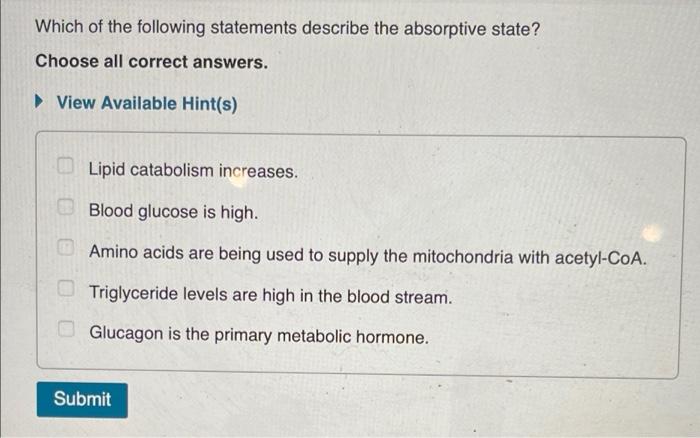Which of the following statements describe the absorptive state? This question invites us to delve into the fascinating physiological and metabolic processes that occur after a meal. As we explore this topic, we will uncover the intricate interplay between the digestive system, hormones, and tissues, gaining a deeper understanding of how our bodies efficiently absorb and utilize nutrients.
The absorptive state is a dynamic physiological state that encompasses the period following a meal when the body actively absorbs and processes nutrients. This state is characterized by a surge in insulin levels, which facilitates the uptake of glucose by tissues throughout the body.
The absorbed glucose is then utilized for energy production or stored as glycogen and fat for future use. The absorptive state is a crucial aspect of maintaining glucose homeostasis and ensuring the proper functioning of various bodily systems.
Definition of Absorptive State

The absorptive state is the physiological state of the body after a meal. During this state, the body is actively digesting and absorbing nutrients from food. The absorptive state is characterized by increased glucose uptake and utilization by tissues, as well as the storage of excess glucose as glycogen and fat.
Hormonal Changes in the Absorptive State
Several hormonal changes occur during the absorptive state. These changes help to regulate the digestion and absorption of nutrients. The most important hormone involved in the absorptive state is insulin. Insulin is released by the pancreas in response to elevated blood glucose levels.
Insulin binds to receptors on cells, which stimulates the uptake of glucose into cells.
Metabolic Changes in the Absorptive State
The absorptive state is characterized by increased glucose uptake and utilization by tissues. This is due to the increased levels of insulin in the blood. Insulin binds to receptors on cells, which stimulates the uptake of glucose into cells. Glucose is then used for energy or stored as glycogen and fat.
Role of Insulin in Facilitating Glucose Uptake
Insulin is a key hormone involved in the regulation of glucose homeostasis. Insulin binds to receptors on cells, which stimulates the uptake of glucose into cells. This process is essential for maintaining normal blood glucose levels.
Gastrointestinal Processes in the Absorptive State

The digestion and absorption of nutrients from food occurs in the gastrointestinal tract. The stomach, small intestine, and large intestine all play important roles in the absorptive state.
Role of the Stomach, Small Intestine, and Large Intestine in Nutrient Absorption, Which of the following statements describe the absorptive state
The stomach secretes gastric juices, which help to break down food. The small intestine is responsible for the majority of nutrient absorption. The large intestine absorbs water and electrolytes from the remaining food material.
Regulation of the Absorptive State
The absorptive state is regulated by a number of mechanisms, including the nervous system and hormonal feedback mechanisms.
Role of the Nervous System in Regulating Digestion and Absorption
The nervous system plays a role in regulating digestion and absorption. The vagus nerve stimulates the secretion of gastric juices and the motility of the gastrointestinal tract.
Clinical Implications of the Absorptive State: Which Of The Following Statements Describe The Absorptive State

Impaired absorption can lead to a number of health problems, including malnutrition and weight loss. Malabsorption syndromes are conditions that interfere with the absorption of nutrients from food. These conditions can be caused by a variety of factors, including celiac disease, Crohn’s disease, and pancreatitis.
Causes and Consequences of Malabsorption Syndromes
Malabsorption syndromes can be caused by a variety of factors, including celiac disease, Crohn’s disease, and pancreatitis. These conditions can lead to malnutrition and weight loss.
Key Questions Answered
What is the primary hormone involved in regulating the absorptive state?
Insulin
What is the main storage form of excess glucose in the body?
Glycogen
What is the role of the small intestine in the absorptive state?
Digestion and absorption of nutrients